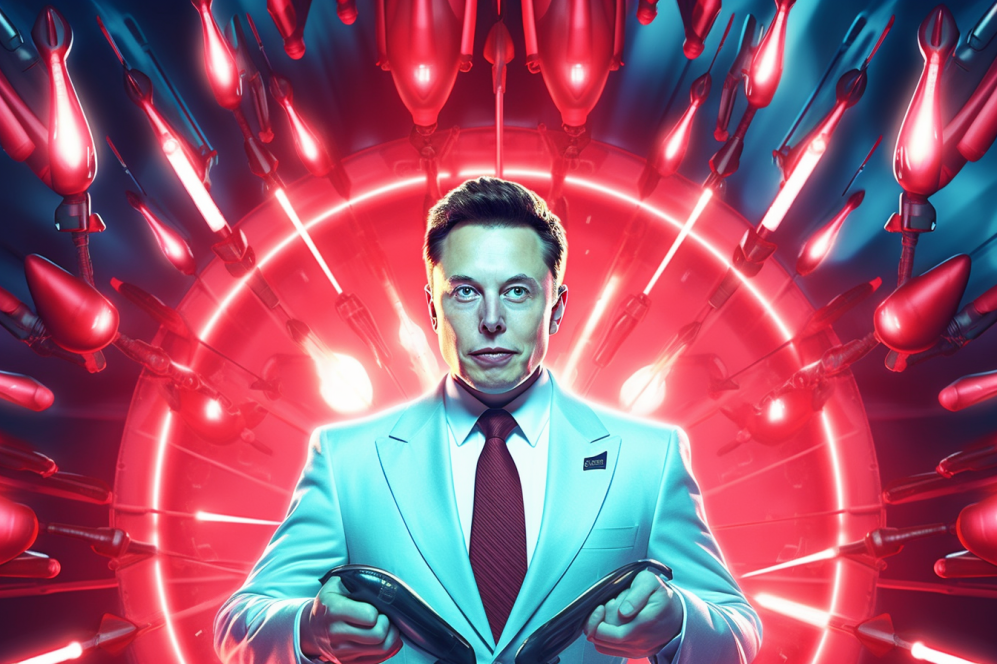Why Neuralink could lead to the biggest market imaginable

It's a new dawn in the technological realm, and the sun is rising on a future shaped by Neuralink and similar brain chips. These groundbreaking innovations could potentially eclipse the Internet and artificial intelligence (AI) in terms of their transformative potential. As we stand on the brink of this new era, let's delve into why these brain-computer interfaces (BCIs) could change our lives and trigger potentially the biggest market we've ever seen.
The Advent of Superhuman Cognition Services
Imagine being able to learn a new language in a day or solve complex mathematical equations in the blink of an eye. This is the promise of superhuman cognition services enabled by Neuralink and similar brain chips. By interfacing directly with our neural architecture, these devices could potentially amplify our cognitive capabilities, paving the way for enhanced memory, faster learning, and heightened creativity.
This cognitive revolution could be the dawn of a new market sector, reminiscent of the rise of cryptocurrencies in the last decade. Just as Bitcoin, Ethereum, and other cryptocurrencies have transformed the financial landscape, superhuman cognition services could change the face of education and professional development.
Moreover, the potential applications extend beyond individual enhancement. For example, decentralized autonomous organizations (DAOs) could leverage collective cognitive enhancement to improve decision-making and problem-solving, creating an entirely new paradigm of collective intelligence.
Revolutionizing Mental Health With Tech
Mental health is a critical aspect of our lives, and Neuralink-like technologies have the potential to bring about a paradigm shift in how we approach mental health care. By monitoring and regulating brain chemistry, these brain chips could offer personalized mental health solutions, addressing conditions ranging from depression and anxiety to more severe disorders like schizophrenia.
In terms of market size, this could be comparable to the current market for mental health services, but with the added advantages of personalized care and potentially higher efficacy. This technology could also intersect with the rising trend of digital health tokens and blockchain-based health records, offering a secure and decentralized approach to managing mental health data.
Sensory Augmentation: A New Way to Experience the World
Neuralink and similar technologies could open the door to sensory augmentation, fundamentally altering how we interact with our environment. Imagine being able to see in the dark, hear ultrasonic sounds, or even perceive infrared or ultraviolet light. These are just a few examples of how sensory augmentation could change our experiences.
The sensory augmentation market could resemble the early days of the Internet, where new applications were being discovered and developed at a rapid pace. This technology could also play a pivotal role in decentralized virtual reality platforms, offering a level of immersion far beyond current capabilities.
Consciousness Sharing Platforms: The Next Social Media Revolution
With the ability to share thoughts, emotions, and experiences directly, consciousness sharing platforms could be the next evolution of social media. This could transform how we connect with others, opening up new avenues for empathy, communication, and shared experiences. These platforms could also become a new form of DAO, where communal decisions are based not just on shared information, but on shared experiences and emotions.
Mind-Controlled Devices: The Future of Interaction
Neuralink and brain chips could usher in an era of mind-controlled devices. The potential applications are vast, from controlling home appliances with a thought to directing drones or even operating machinery in a factory setting. This technology could revolutionize accessibility, offering people with physical disabilities a new level of independence.
In the same way that the advent of blockchain technology led to the rise of decentralized finance (DeFi) and DAOs, mind-controlled devices could disrupt various industries, creating a new market for mind-controlled tech.
Customized Entertainment Experiences: A New Era of Immersion
Imagine watching a movie, playing a game, or experiencing a music concert, not just through sight and sound, but with an array of augmented sensory experiences designed to maximize immersion. This could be the future of entertainment with Neuralink-like technologies. It could lead to the emergence of a new entertainment market, one that caters to customized experiences, tailored to individual preferences and sensory capabilities.
For example, imagine a decentralized streaming service, where content is not just consumed, but experienced in a much more immersive and personalized way. This could lead to a paradigm shift in how we consume and interact with media, opening up new possibilities for content creators and consumers alike.
Recent Advancements and Looking Forward
Recent advancements in Neuralink's technology have shown us a glimpse of this future. In 2023, Neuralink received regulatory approval to conduct the first clinical trial of its experimental device in humans. This comes after years of research and development, with Neuralink entering the industry in 2016 and designing an electrode-laden computer chip, called the Link, that can be sewn into the surface of the brain and connects it to external electronics.
While the broad scope of capabilities Musk is promising from the Neuralink device has garnered skepticism from experts, the potential uses are vast. Musk has claimed that Neuralink’s device could be used for a range of therapeutic uses, to treat conditions like blindness, paralysis, depression. But he has also said that the eventual aim is to create a “general population device” that could connect a user’s mind directly to supercomputers and help humans keep up with artificial intelligence. He has also suggested that the device could eventually extract and store thoughts, as “a backup drive for your non-physical being, your digital soul”.
So far, Neuralink has tested its chips on animals, with videos showing a monkey using the device to play the video game Pong with his mind and another typing on a computer telepathically. The FDA approval cleared the first hurdle toward a human clinical trial, but the scope, focus and design of any such study remains unclear. Safety concerns related to the implant’s lithium battery and potential overheating, questions over whether the machine’s small wires could migrate to other parts of the brain and that the device cannot be removed without damaging brain tissue, were some of the challenges Neuralink had to address before human testing.
Implications and Final Thoughts
The implications of Neuralink and similar brain chips are profound, spanning across sectors from education to healthcare, entertainment to social interaction. As we move forward, it's important to navigate this new landscape with caution, balancing the excitement of the potential benefits with an awareness of the ethical, safety, and societal implications.
While there's still much we don't know about how these technologies will develop and integrate into our lives, one thing is clear: Just as the Internet and AI have transformed our world, Neuralink and brain chips could usher in an even more dramatic shift, presenting a market potential that's virtually unimaginable.
In the context of the blockchain revolution, this could mean a symbiotic relationship between BCIs and decentralized technologies. For example, BCIs could integrate with blockchain networks to facilitate secure, private transactions, or to manage digital identities in a decentralized manner. Moreover, DAOs could potentially use BCIs to enhance collective decision-making, opening up new models of governance and collaboration.
This brave new world of BCIs is not just about individual enhancement, but about collective evolution. It's about harnessing the power of our minds to shape our world in ways we've only dreamed of - and in the process, creating a future that truly is, in the words of sci-fi writer William Gibson, "a distributed network."
Check BTC Peers guide of the most promising crypto





